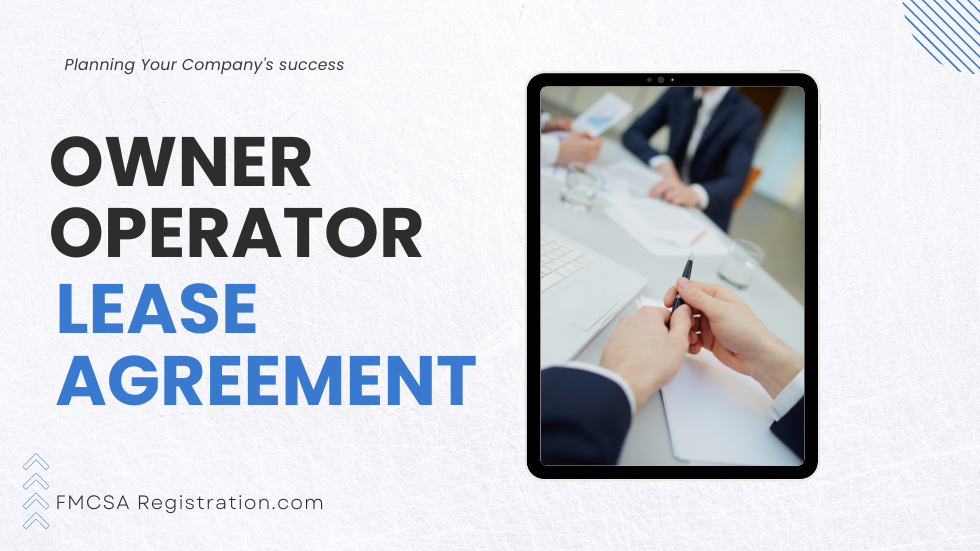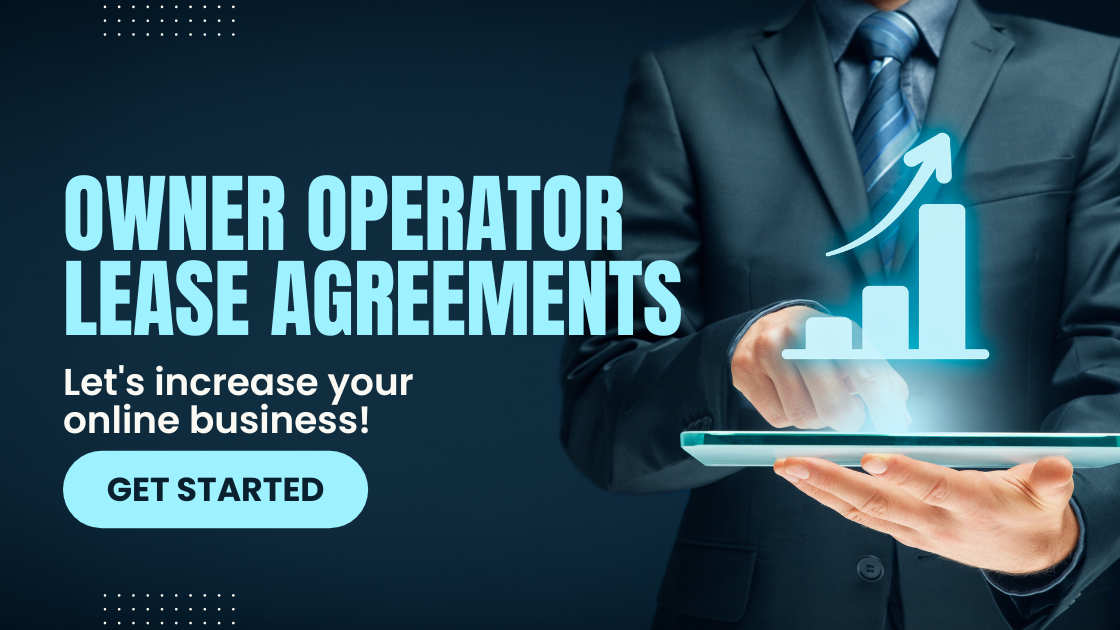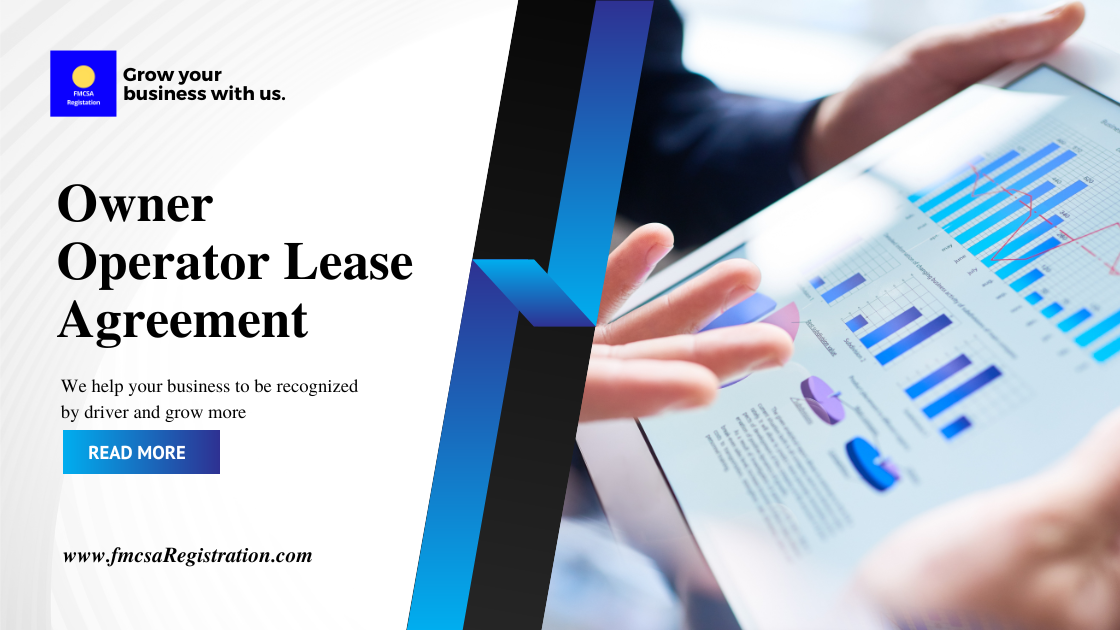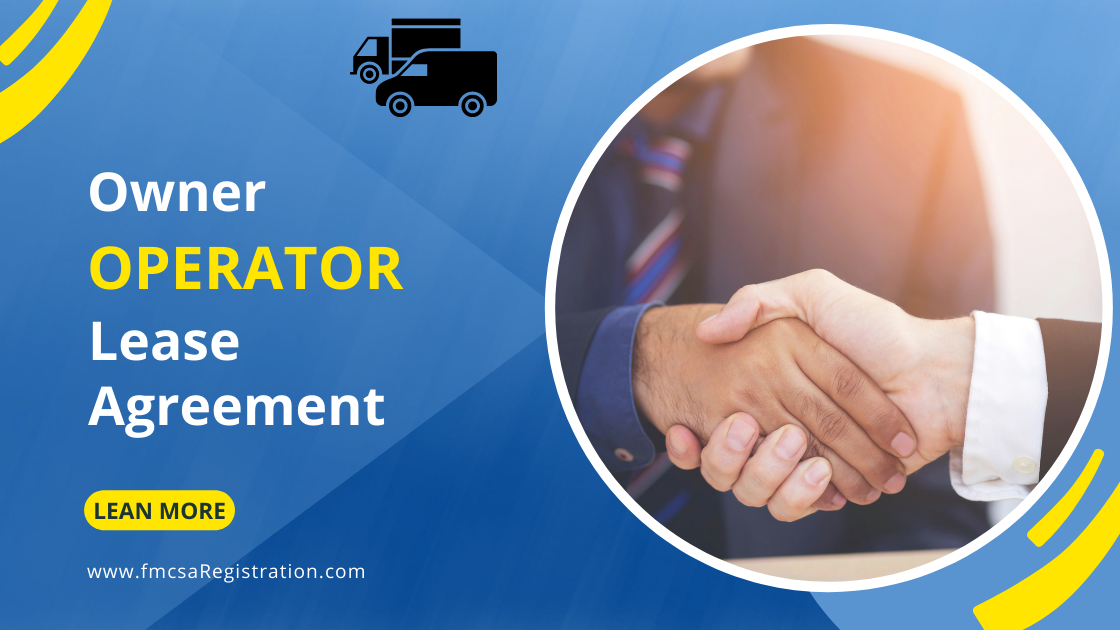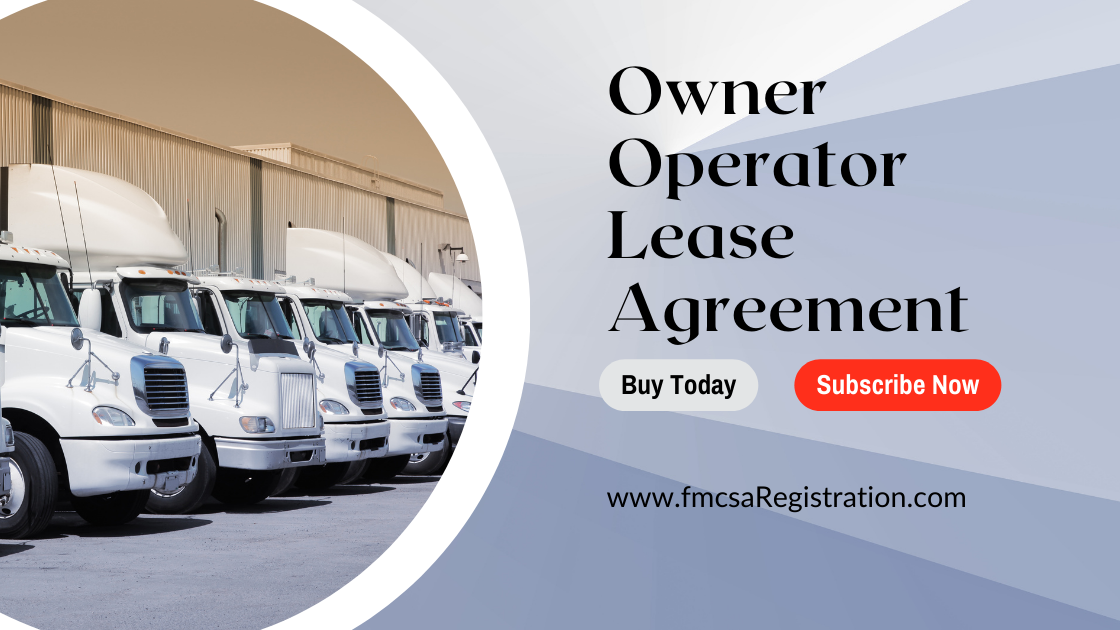Owner Operator Lease Agreement
$197.90 Only
$197.90$197.90 Only
Product Code: 133
Product Description:
Owner Operator Lease Agreement: How Any Owner
training today. Description 2: New If you need first-rate hazmat training, look no further than FMCSAregistration.com
New As you may know, the Department of Transportation (DOT) has many regulations in place
New Function-specific DOT hazmat courses focus on understanding regulations
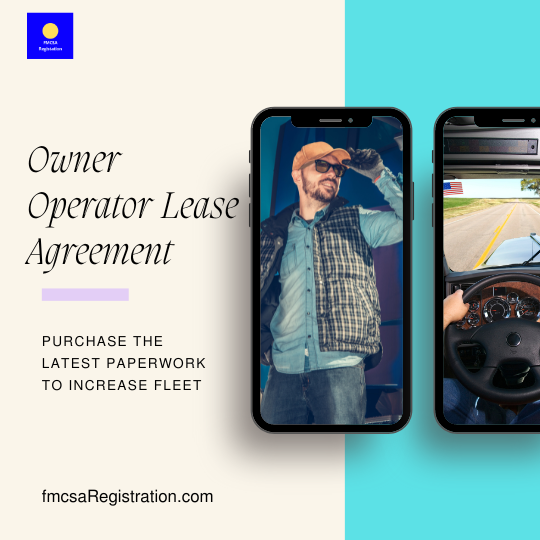
How Any Owner Operator Can Create a Lease Agreement
Are you confused about how an owner operator lease agreement functions? You're not alone. Many individuals and companies struggle to create or interpret agreements. But do not put off understanding how lease agreements function any longer. Leasing owner-operators is often a great solution for carriers and trucking companies. Doing so can help them make more money. Plus, it’s a fast way for a company to boost the capacity of a fleet. Let’s go ahead and jump into the basics of how an owner operator lease agreement functions. Also, please check out our BOC-3 Filing page.
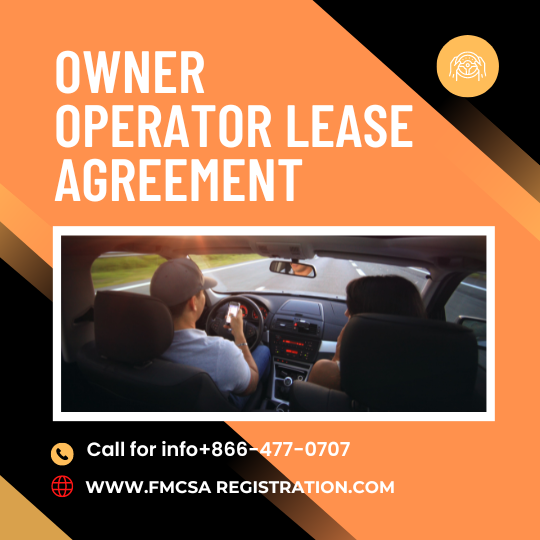
How the Owner Operator Agreement Process Works for a Carrier
Trucking companies and owner-operators alike must understand how lease agreements function. There are some crucial pitfalls to keep in mind when leasing owner operators. Say that an owner operator gets leased onto a carrier. The FMCSA now considers the driver and truck as “the carriers.” This is for compliance reasons. Now, say the owner operator doesn’t finish a logbook. Or, her or she receives a vehicle violation. All infractions go inside a carrier’s FMCSA safety data. That’s why the majority of carriers leasing owner operators have certain standards. The standards play a role when deciding whether to lease an owner operator into a fleet. They also apply when figuring out whether to continue leasing an owner operator. Please also visit our DOT Authority Package .
Carriers should exercise caution when leasing an owner operator. It’s best not to treat an owner operator in the same manner as an employee. Doing so can lead to severe consequences for any US carrier. That’s why many carriers do not enforce owner operators to take certain actions. In fact, sometimes carriers even refuse to provide help to an owner operator. This brings up a key reason why leasing an owner operator into a fleet gets complicated. The process is difficult from the standpoint of both an owner operator and carrier. But here's some good news. The FMCSA has a series of lease agreement regulations in place. The regulations serve to protect carriers and owner operators. Do you want to learn all about IRP? If so, check out our What Is IRP ? page.
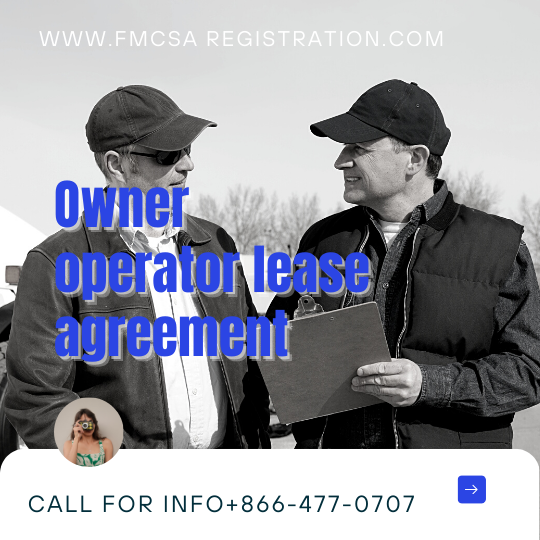
The Basics of Leasing an Owner-Operator & Drafting a Vehicle Agreement
The FMCSA (Federal Motor Carrier Safety Administration) has a series of lease regulations. When it comes to owner operators, many refer to them as “truth in leasing” regulations. The regulations detail how an owner operator can secure a lease through a carrier. Let’s go over the basics of how carriers can set up their lease agreements. A carrier’s owner operator lease agreement must do the following:
- An owner operator lease agreement must name all involved parties. Then, all parties must sign the agreement.
- The lease agreement has to define the exact duration of the lease.
- Each owner operator lease agreement must identify all equipment that will get used.
- The lease agreement should state that a carrier has “control” and “exclusive possession.” Both terms apply to the duration and details of the lease.
- Every owner-operator lease agreement defines exact lease termination procedures. This includes getting rid of a carrier’s name when a lease gets terminated. You can use our website to learn about the FMSCA 30-Minute Break Rule.
- A lease agreement should define the method of compensation. But that’s not all. It must also state the rate of payment that goes toward the owner operator. Please scroll down to learn more about the official FMCSA rules of payment. What is DOT SAP Program? Our company will provide you with the information you need.
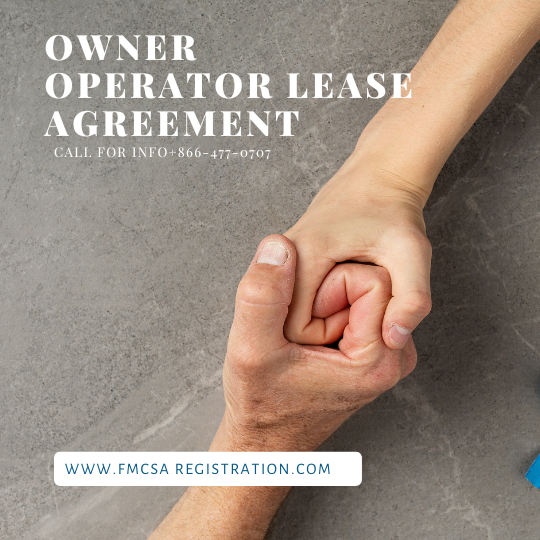
Fleet & Vehicle Information for an Owner-Operator To Include in a Lease Agreement
That’s right- we’re not finished when it comes to information to include in an agreement. All US carriers must feature the following information inside every lease agreement. Otherwise, they could face severe fines and penalties from the FMCSA. Make sure that you feature the following information inside each agreement:
- Explain all charge-backs that will get paid by your carrier. Then, the charges take place against an owner operator. We can tell you how to do IFTA Sticker Registration.
- Feature a “not required to buy or rent” clause. Why? Because a lease has to explain something crucial. It’s that buying equipment/services from a carrier isn’t a condition of the agreement. Say that the owner operator buys services or equipment from a carrier. The lease has to state the unique terms related to the purchase. Check out our DOT Audit page.
- Define the carrier’s legal obligation to maintain public liability. (This can also refer to cargo insurance.) Say that an owner buys insurance through a carrier. That carrier must receive detailed information about the insurance policies. Visit FMCSA Hours of Service Suspended.
- State who’s responsible for different types of insurance, like bobtail coverage.
- Define when deductions take place that goes toward the owner-operator’s settlement. This relates to the damage of cargo or property.
- If escrow funds are at play, explain how they function in the agreement. This includes the amount withheld, the items the escrow applies toward, etc.

Customer Reviews
Great Services!
FMCSA Registration LLC has been a life-saver for my company. They ensure that my employees comply with all FMCSA regulations. We haven’t been fined or penalized in many years. And I owe that to the great folks at FMCSA Registration LLC. They are the only third-party registration service that I trust.
My organization has been securing DOT Numbers, MC Numbers, UCR Registration, and all other FMCSA requirements from FMCSA Registration LLC for well over a decade. Why? Their services are lightning-fast, their customer service is excellent, and they go the extra mile to make sure that we maintain full compliance at all times. A+++.
FMCSA Owner Operator Rules of Payment for Any Carrier With a Fleet
The FMCSA has a series of rules about a carrier paying an owner operator. Please contact Registration LLC for the complete list of rules. In the meantime, these are the three most important FMCSA rules to consider:
1. A method of payment does not get prescribed through FMCSA regulations. But the agreement must state the specific payment method(s). This applies to the percentage of revenue, mileage, trips, etc.
2. The FMCSA puts an exact payment window in place. Payment beyond 15 days after proof of delivery isn’t allowed under FMCSA rules.
3. Say that payment to an operator gets based on the percentage of revenue. The lease has to feature a “right to inspect” carrier billing.
What Is an Owner Operator Lease Agreement?
Think of an owner operator as an independent contractor in the trucking industry. The owner can either lease or own automotive equipment. This relates to operating on the interstate on behalf of for-hire transportation services. An operator can lease with any qualified carrier as a driver. When doing so, a lease agreement must get put in place. It serves as a legal document to provide both drivers and carriers. Please visit our Starting a Trucking Company page.
How Much Do Lease Owner Operators Make?
The revenue of owner operators that get leased can vary based on many factors. Some leased owner operators make under $100,000 per year. Others make well over $235,000 per year. It also depends on how an operator manages his or her business. Please read about USDOT Number Registration.
How Do Owner Operators Get Contracts?
Owner operators have many opportunities when it comes to getting individual load contracts. Their best bet is to use load boards and find dispatchers. Both of which can help each owner find loads with certain freight. (And at the right price.) The trucking industry’s very dependent on load boards. Please contact our organization now if you need access to load boards or dispatchers. We can help find you lucrative loads in your local area. Check out Trucking Operating Packages.
Sample PDF Agreements for Owner Operators & Carriers
Are you an operator or motor carrier in need of a sample lease agreement? If so, please contact our organization right now. Our trucking industry experts can do more than supply basic sample agreements. Instead, they can go the extra mile and help you access a unique sample. The sample can apply to your specific needs as a carrier or operator. But Registration LLC doesn’t stop there.
Our team can even draft a lease agreement on your behalf. This way, you won’t have to spend hours learning about FMCSA regulations. (Leave that to us.) Instead, we’ll put you on the fast track toward executing an FMCSA-approved agreement. In fact, we can draft any type of FMCSA-related document that you need. All you've got to do is pick up the phone and give our trucking professionals a call. Visit Unified Carrier Registration.
What Happens Once a Lease Agreement PDF Is Valid & Not a Sample?
Say that a lease agreement gets agreed to and signed by both parties. The owner operator and carrier now have to create a “receipt of equipment” statement. The statement will declare when a vehicle is under official control of the carrier. At this point, most carriers will inspect the equipment of the operator. This is to ensure that the equipment meets the carrier’s standards. Going forward, the carrier’s responsible for driver compliance and vehicle compliance. This means each carrier has to create a driver qualifications file for the operator. Then, the owner operator can take part in the carrier’s drug and alcohol testing program .
Say that the driver receives qualified status. The owner operator can now begin working for the motor carrier. Keep in mind that the owner operator’s vehicle must have proof of the lease/agreement. He or she must hold onto proof of the lease while driving. Plus, the power unit of the truck must get marked. The marking should feature the DOT Number and name of the carrier. People must have the ability to see the marking from fifty feet away. Do you need to learn how to get a TEXAS DOT Number? Our company can help you secure the number.
We Provide Owner Operator Agreement Solutions
Do you need help creating a new owner operator agreement? If so, please call or email Registration LLC at any time. Our contract experts can help you write a new owner operator agreement ASAP. You're welcome to send the current contract. Otherwise, we’ll help you write a new contract from scratch. We use advanced form creation software featuring a variety of templates. Our team can email you some sample form templates right now. The Registration LLC crew looks forward to helping your services improve.
Our Experts Can Guide You Through More FMCSA Rules & Regulations for Lease Agreements
The FMCSA and DOT are strict when it comes to owner operator lease agreements. But do not despair. Our experts can help you create an agreement at any moment. Or, you're welcome to send over a current agreement for us to review. We can make sure that it adheres to all official FMCSA policies. (And there are many.) This way, both carriers and owner operators can avoid expensive fines and violations. Sometimes one single violation can stop a carrier from making money for months. This also applies to leased owner operators. Our mission is to prevent that from happening to you and/or your business. Please give us a call right now if you need more information about lease agreements. We look forward to helping you succeed. And our experts can help you get an MC Number at any time.
